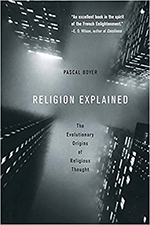16 July 2018
Religion Explained by Pascal Boyer
Posted by Callan Bentley
 Religion Explained is an interesting book. It examines the phenomenon of religion in human beings from the perspective of our best understanding (as of 2001) of neurology, psychology, anthropology, and evolution. It takes the modern scientific understanding of how brains evolved, and looks there for the origins of religious thought and its tenacity despite countervailing forces. Pascal Boyer’s contention is that we can come to understand religion better by thinking of it not as socially adaptive (a frequently invoked hypothesis), but as a “parasitic” in the sense of taking advantage of pre-existing structures (algorithms) in our brains. Boyer contends that when several different mental pathways in our minds (each themselves adaptive in the sense of natural selection) become co-opted by religion, a new mental phenomenon emerges and is maintained. It’s a ‘chewy’ book, with lots of anthropological field work observations in diverse human cultures coupled with novel ways of articulating the thought processes and rituals of modern Western religions. It explores the evolution of key mental algorithms (such as the perception of agency, and the ability to mentally assign it to non-agents) in detail, sometimes perhaps excessively so. But it’s compelling: Many of Boyer’s detailed explorations hit home with me as surprising and insightful. The overall thesis makes more sense to me than alternate explanations. I found it a moderately recommendable read – interesting stuff, and possibly a correct vision for explaining religion, but also pretty weighty in construction; Each sub-topic is explored in such detail that it ends up being hard to pick up the main thread of the argument when Boyer eventually gets back to it. I think a good editor could have trimmed it by a third and it would have made for a cleaner, more efficient reading experience. Recommended for those who wish to understand the origins of this otherwise quixotic (or obvious, depending on whether you’re a believer or an atheist) phenomenon.
Religion Explained is an interesting book. It examines the phenomenon of religion in human beings from the perspective of our best understanding (as of 2001) of neurology, psychology, anthropology, and evolution. It takes the modern scientific understanding of how brains evolved, and looks there for the origins of religious thought and its tenacity despite countervailing forces. Pascal Boyer’s contention is that we can come to understand religion better by thinking of it not as socially adaptive (a frequently invoked hypothesis), but as a “parasitic” in the sense of taking advantage of pre-existing structures (algorithms) in our brains. Boyer contends that when several different mental pathways in our minds (each themselves adaptive in the sense of natural selection) become co-opted by religion, a new mental phenomenon emerges and is maintained. It’s a ‘chewy’ book, with lots of anthropological field work observations in diverse human cultures coupled with novel ways of articulating the thought processes and rituals of modern Western religions. It explores the evolution of key mental algorithms (such as the perception of agency, and the ability to mentally assign it to non-agents) in detail, sometimes perhaps excessively so. But it’s compelling: Many of Boyer’s detailed explorations hit home with me as surprising and insightful. The overall thesis makes more sense to me than alternate explanations. I found it a moderately recommendable read – interesting stuff, and possibly a correct vision for explaining religion, but also pretty weighty in construction; Each sub-topic is explored in such detail that it ends up being hard to pick up the main thread of the argument when Boyer eventually gets back to it. I think a good editor could have trimmed it by a third and it would have made for a cleaner, more efficient reading experience. Recommended for those who wish to understand the origins of this otherwise quixotic (or obvious, depending on whether you’re a believer or an atheist) phenomenon.


 Callan Bentley is Associate Professor of Geology at Piedmont Virginia Community College in Charlottesville, Virginia. He is a Fellow of the Geological Society of America. For his work on this blog, the National Association of Geoscience Teachers recognized him with the James Shea Award. He has also won the Outstanding Faculty Award from the State Council on Higher Education in Virginia, and the Biggs Award for Excellence in Geoscience Teaching from the Geoscience Education Division of the Geological Society of America. In previous years, Callan served as a contributing editor at EARTH magazine, President of the Geological Society of Washington and President the Geo2YC division of NAGT.
Callan Bentley is Associate Professor of Geology at Piedmont Virginia Community College in Charlottesville, Virginia. He is a Fellow of the Geological Society of America. For his work on this blog, the National Association of Geoscience Teachers recognized him with the James Shea Award. He has also won the Outstanding Faculty Award from the State Council on Higher Education in Virginia, and the Biggs Award for Excellence in Geoscience Teaching from the Geoscience Education Division of the Geological Society of America. In previous years, Callan served as a contributing editor at EARTH magazine, President of the Geological Society of Washington and President the Geo2YC division of NAGT.